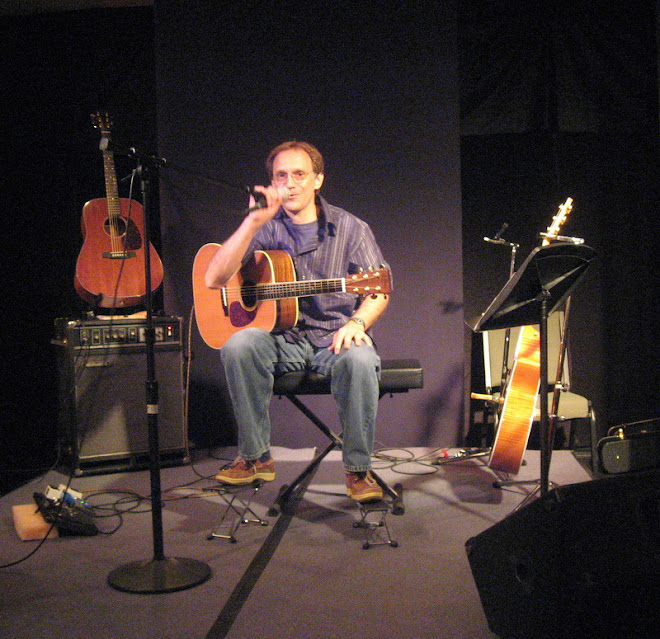Players

"Fancy Al Cath" - the story behind the name..
Fingerstyle Acoustic Guitar Lessons
I can show you how to play full, rich-sounding solo arrangements that showcase the acoustic guitar as a single self-sufficient instrument. Amazingly, it's not that hard to do - especially when someone shows you what to do. It's not about stunt work; just care, finesse, and great tone.
I specialize in searingly beautiful instrumentals in both standard and non-standard tunings (Laurence Juber, Ed Gerhard), and intricate fingerstyle guitar as vocal accompaniment (James Taylor, Bonnie Raitt).
Laurence Juber, formerly Paul McCartney’s lead guitarist in Wings, #14 on the top 100 acoustic guitarists in the world. Juber opens and closes Beatles conventions the world over with his rich, astonishingly complete-sounding instrumental arrangements of Beatles classics like Money Can't Buy Me Love, Yesterday, Let It Be, Yesterday, Here Comes The Sun, Strawberry Fields Forever, In My Life, For No One, This Boy, and more (search YouTube for Juber).
Besides his Beatles material, I also perform and teach many of Juber's other arrangements of traditionals and standards (Pink Panther, Danny Boy, Somewhere Over The Rainbow, Joy of Man, Pavane), and several of his original compositions (Love At First Sight, Cat Hill, Buffalo Nickel, Catch, The 5:55, When Harry Finally Got To Heaven).
Ed Gerhard's style, arrangements and compositions are quite different than Laurence Juber's, but just as striking. I perform and teach his mesmerizing interpretations of The Water Is Wide and Moon River.
If you aspire to this type of playing style - if you're searching for something more than just rhythm or lead - come work with me for an hour a week. I will show you how to play these irresistibly beautiful instrumentals that never fail to impress, and/or how to use your guitar to add tremendous dimension to your vocals.
I am in Sudbury, MA. My schedule is quite flexible (weekday evenings or weekends are OK), and the rate is reasonable. Email me at al@alancath.com and we'll set up a time to talk on the phone.

Acoustic guitar as entertainment
My instrumental guitar music is ideal for mature situations like wedding cocktail hours, corporate functions, or dinner parties where you're looking for something entertaining but non-intrusive going on in the background.
Much of the material consists of intricate, full-sounding guitar arrangements of popular, recognizable material that most everyone loves - from classic Beatles tunes like Let It Be, Yeserday, Here Comes The Sun, Strawberry Fields Forever, and In My Life, to standards like Somewhere Over The Rainbow, Moon River, The Water Is Wide, and Danny Boy (see video at right).
.jpg)
I have a lifetime of musical involvement in one form or another, first keyboards, later guitars (6-string acoustic and electric, 12-string, pedal steel). My style is not about high speed gymnastics - it's about touch and finesse; it's about making making every note count. My goal as a musician is to evoke strong emotion in the listener; I go straight for the heart.
After a recent performance at the Sit 'n' Bull Pub, emcee and professional musician Seth Connelly told the crowd, "I have spent a lot of time putting love into a guitar, but I don't remember when I've heard so much love coming out of one."
That... is exactly what I strive to accomplish.



The Canvas Gallery - San Francisco, CA 8/06
.jpg)
Friday, October 26, 2007
7 benefits of regular physical activity
Need motivation to exercise? Here are seven ways exercise can improve your life — starting today!
Want to feel better, have more energy and perhaps even live longer? Look no further than old-fashioned exercise.
The merits of exercise — from preventing chronic health conditions to boosting confidence and self-esteem — are hard to ignore. And the benefits are yours for the taking, regardless of age, sex or physical ability. Need more convincing? Check out seven specific ways exercise can improve your life.
1. Exercise improves your mood.
Need to blow off some steam after a stressful day? A workout at the gym or a brisk 30-minute walk can help you calm down. Exercise stimulates various brain chemicals, which may leave you feeling happier and more relaxed than you were before you worked out. You'll also look better and feel better when you exercise regularly, which can boost your confidence and improve your self-esteem. Exercise even reduces feelings of depression and anxiety.
2. Exercise combats chronic diseases.
Worried about heart disease? Hoping to prevent osteoporosis? Regular exercise might be the ticket. Regular exercise can help you prevent — or manage — high blood pressure. Your cholesterol will benefit, too. Regular exercise boosts high-density lipoprotein (HDL), or "good," cholesterol while decreasing low-density lipoprotein (LDL), or "bad," cholesterol. This one-two punch keeps your blood flowing smoothly by lowering the buildup of plaques in your arteries.
And there's more. Regular exercise can help you prevent type 2 diabetes, osteoporosis and certain types of cancer.
3. Exercise helps you manage your weight.
Want to drop those excess pounds? Trade some couch time for walking or other physical activities. This one's a no-brainer. When you exercise, you burn calories. The more intensely you exercise, the more calories you burn — and the easier it is to keep your weight under control. You don't even need to set aside major chunks of time for working out. Take the stairs instead of the elevator. Walk during your lunch break. Do jumping jacks during commercials. Better yet, turn off the TV and take a brisk walk. Dedicated workouts are great, but activity you accumulate throughout the day helps you burn calories, too.
4. Exercise strengthens your heart and lungs.
Winded by grocery shopping or household chores? Don't throw in the towel. Regular exercise can leave you breathing easier. Exercise delivers oxygen and nutrients to your tissues. In fact, regular exercise helps your entire cardiovascular system — the circulation of blood through your heart and blood vessels — work more efficiently. Big deal? You bet! When your heart and lungs work more efficiently, you'll have more energy to do the things you enjoy.
5. Exercise promotes better sleep.
Struggling to fall asleep? Or stay asleep? It might help to boost your physical activity during the day. A good night's sleep can improve your concentration, productivity and mood. And, you guessed it, exercise is sometimes the key to better sleep. Regular exercise can help you fall asleep faster and deepen your sleep. The timing is up to you — but if you're having trouble sleeping, you might want to try late afternoon workouts. The natural dip in body temperature five to six hours after you exercise might help you fall asleep.
6. Exercise can put the spark back into your sex life.
Are you too tired to have sex? Or feeling too out of shape to enjoy physical intimacy? Exercise to the rescue. Regular exercise can leave you feeling energized and looking better, which may have a positive effect on your sex life. But there's more to it than that. Exercise improves your circulation, which can lead to more satisfying sex. And men who exercise regularly are less likely to have problems with erectile dysfunction than are men who don't exercise, especially as they get older.
7. Exercise can be — gasp — fun!
Wondering what to do on a Saturday afternoon? Looking for an activity that suits the entire family? Get physical! Exercise doesn't have to be drudgery. Take a dance class. Check out a local climbing wall or hiking trail. Push your kids on the swings or climb with them on the jungle gym. Plan a neighborhood kickball or touch football game. Find an activity you enjoy, and go for it. If you get bored, try something new. If you're moving, it counts!
The arguments for not exercising are few....
Weight control
Heart disease
Stroke
Cholesterol level
Cancer
Bone density
Diabetes
Decreased depression
Reduced anxiety
Buffer against stress
Ehanced self-esteem
All-cause mortality
Are you convinced yet? How many benefits do there need to be in order to convince you. (Of course, I'm talking to myself, too.)
The best part is that reseach has also shown that vigorous effort offers no incremental benefit in increased health over moderate exercise. No need to go nuts over this. Just do something (as opposed ot nothing. When do we get started?
What is health?
This question begets another: "What is health?" The definition of health has changed considerably in the past century. In the early 1900's, health was though of as the absence of disease. This is because the diseases that were most common at that time were largely the result of contact with impure drinking water, contaminated foods, or sick people. The leading causes of death were from infectious diseases (typhoid fever, pneumonia, diptheria, influenza, tuberculosis). The afflicted either died or got well in a matter of weeks.
But during the 20th century, health changed in the U.S. - the leading causes of death changed from infectious diseases to chronic diseases such as heart disease, cancer, stroke, chronic lower respiratory diseases such as emphysema and bronchitis - all of which relate to individual behaviors and lifestyles. These diseases were not new, but the proportion of people who die from them changed. We found out how to deal with the infectious diseases and started living long enough to die of chronic diseases, which can be tied to smoking, alcohol abuse, unwise eating, stress, and sedentary lifestyle. Robert Sapolski (1998) said "We are now living long enough to slowly fall apart." Indeed, in the 20th century life expectancy increased by 30 years, thus leaving us exposed to death from diseases that 100 years ago we weren't living long enough to get.
Although chronic diseases have many causes, individual behavior and lifestyle have an enormous impact on their development. Because behavior is so important for chronic disease, psychology, which is the science of behavior, has become involved in health care. A large part of psychology's involvement in health care is a commitment to keeping people healthy, rather than waiting until after they are ill to treat them. Unlike medicine, psychology contributes to broad principles of behavior which directly impacts health issues and diseases. Why do people exercise... or why don't they? Why do people try to eat a healthy diet - or why don't they? Why do people smoke? Why can't they stop? Why to people engage in such unhealthy behaviors, and what would it take to change these behaviors? Why do people seek medical care, and at what point? Why do they fail to seek medical care? What would it take to change this behavior? How are these behaviors influenced by ethnicity, education level, income level, and age?
These are the concerns of Health Psychology.
Health is no longer defined as the absence of disease. In 1946 the World Health Organization (WHO) wrote the modern Western definition of health: "Health is a state of complete physical, mental, and social well-being, and not merely the absence of disease or infirmity.", which affirms that health is a positive state and not just the absence of disease. Feeling good is more than just not feeling bad.


